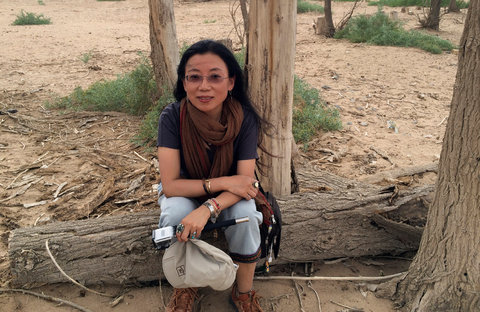
By EDWARD WONG
July 15, 2014 2:26 am
Tsering Woeser, a Tibetan writer who often criticizes policies of the Chinese Communist Party, said she was surprised when she heard a United States Embassy official offering her a dinner invitation over her cellphone, since she knew her phone conversations were constantly being monitored by Chinese security officers.
“When the embassy contacted me, it was via my mobile phone, which has always been tapped,” Ms. Woeser said in a telephone interview on Monday. “So I was a little surprised by the invitation when they called. I thought, hmm, a real invitation. The national security guys surely know. Such a public invitation, does that mean it was granted?”
The invitation was offered a few days before Secretary of State John Kerry arrived in Beijing last week for a session of the U.S.-China Strategic and Economic Dialogue. Last year, Ms. Woeser received from the State Department an International Women of Courage Award. The Chinese government placed her under house arrest at that time to prevent her from traveling to the United States to collect the award. Mr. Kerry praised her in a speech.
The American official calling her did not mention who would be at the dinner, Ms. Woeser said. But it was taking place on a night when Mr. Kerry was in town.
This latest house arrest began on the evening of July 8, a few days after Ms. Woeser received the embassy call, and just one hour after she and her husband, Wang Lixiong, a scholar of ethnic issues in China, had returned to their Beijing apartment from a trip to Inner Mongolia. Presumably security officers were aware of the embassy invitation. Young men sent by the police arrived at 7 p.m., one hour after the couple had returned.
The guards, who were dressed in plain clothes, sat in chairs by the elevators in the outside hallway. They stayed for two days, just as they had promised when they first arrived.
Most of the guards were students from the People’s Public Security University, which provides training in security and law enforcement, Ms. Woeser wrote on her blog, Invisible Tibet, on the night the house arrest began.
“Wang Lixiong asked the Public Security University students if they knew that what they were doing was illegal,” she wrote. “A student gave a very funny answer: ‘I have the right not to answer your question.’ It was as if he were being questioned at a trial.”
Last year, during the 24th anniversary of the June 4, 1989, military crackdown around Tiananmen Square, students from that university also showed up to place the couple under house arrest, Ms. Woeser said in a Twitter post on Thursday. The ones who camped out by her apartment last week appeared no different.
“They were summer interns,” she wrote on Twitter. “They were learning how to deal in the future with the enemies of the party.”
“I don’t know if they were kids from the country or from the cities,” she added. “Every time they opened their mouths, they said, ‘Our leaders sent us.’”
The day the young guards left, Nolan Barkhouse, a United States Embassy spokesman, released a statement about Ms. Woeser’s house arrest.
“We are concerned by media reports that Tsering Woeser was placed under house arrest and prevented from attending a dinner hosted by the U.S. Embassy in Beijing, and we are looking into the matter,” he said.
On Monday, during the telephone interview, Ms. Woeser gave a dire assessment of the situation in Tibetan regions, where more than 120 people have set themselves on fire as a political protest in recent years, unnerving Chinese officials.
“The current situation hasn’t changed, and the oppression still has not been relaxed,” she said. “As for what will happen in the future, it’s difficult to predict. On the one hand, the authorities’ policy of guilt by association is very harsh, and also the current tactic of control is one of micromanagement. The entire Tibetan area is under a management grid. On the surface, it appears that the situation had been easing up from such strict control, but it hasn’t. The Lhasa that I know is still under tight control.”
“The authorities want to present to the world a Tibet that is happy, harmonious and satisfied,” she continued. “Yet in reality there are many problems. What I talk about are those problems, and I tell the truth. That piques the authorities.”
Patrick Zuo and Mia Li contributed research.
